Organizational Culture and Behavior at Marks & Spencer, UK Report
VerifiedAdded on 2022/12/12
|10
|3019
|326
Report
AI Summary
This report provides a comprehensive analysis of organizational behavior within Marks & Spencer (M&S), a prominent UK-based retail company. The report begins by defining organizational behavior and outlining the study's objectives. It then explores M&S's organizational culture, examining its key components, including leadership principles, business nature, company values, and recruitment processes. The report applies Charles Handy's cultural theory to M&S, identifying its role-based culture and justifying this classification. The analysis further investigates how organizational culture enhances effectiveness, focusing on communication processes and management styles. The report also examines the role of culture in employee motivation, applying Maslow's hierarchy of needs to understand how M&S's culture fosters employee engagement and satisfaction. The report concludes with an evaluation of the findings, summarizing the key insights into M&S's organizational dynamics and offering recommendations based on the analysis.
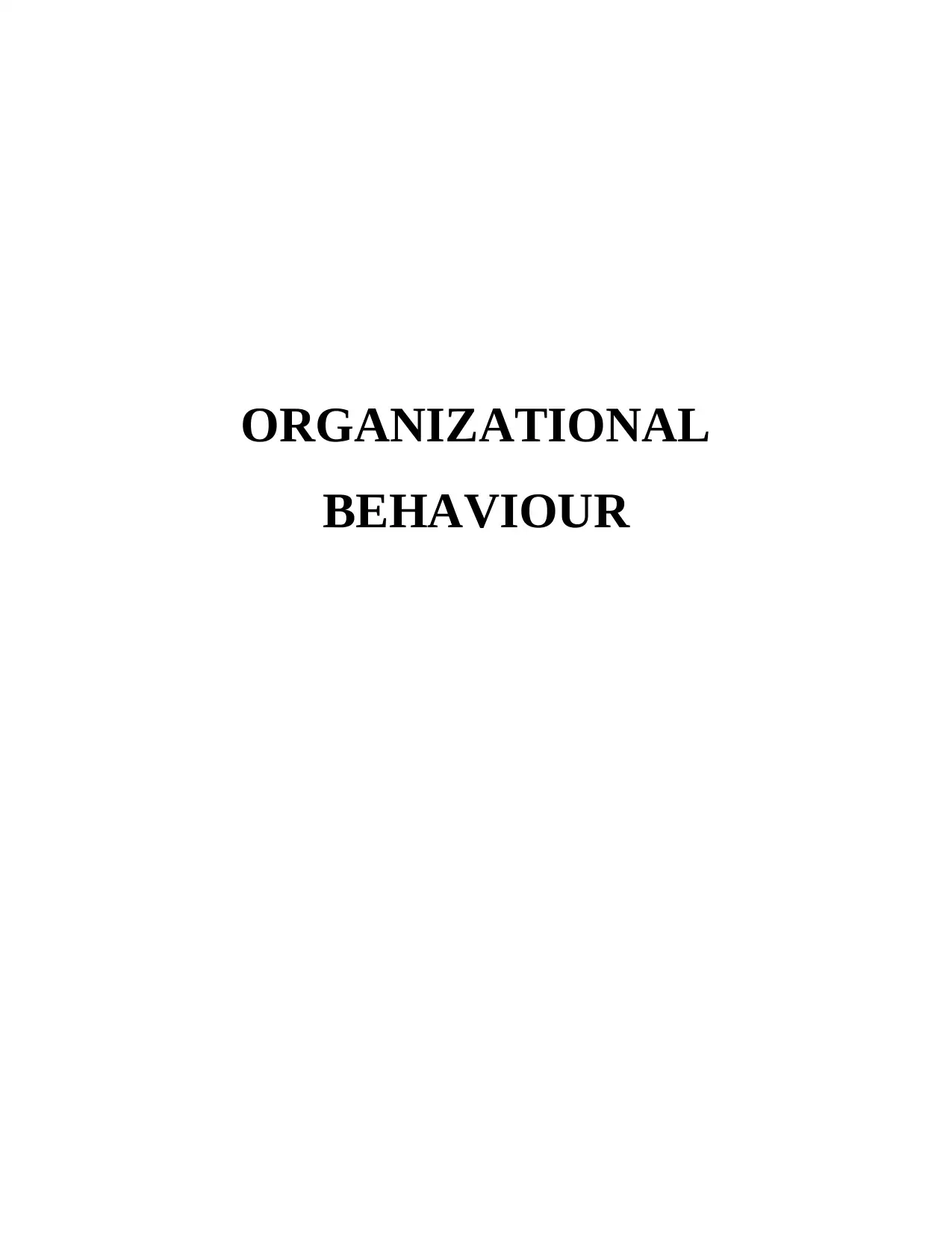
ORGANIZATIONAL
BEHAVIOUR
BEHAVIOUR
Paraphrase This Document
Need a fresh take? Get an instant paraphrase of this document with our AI Paraphraser
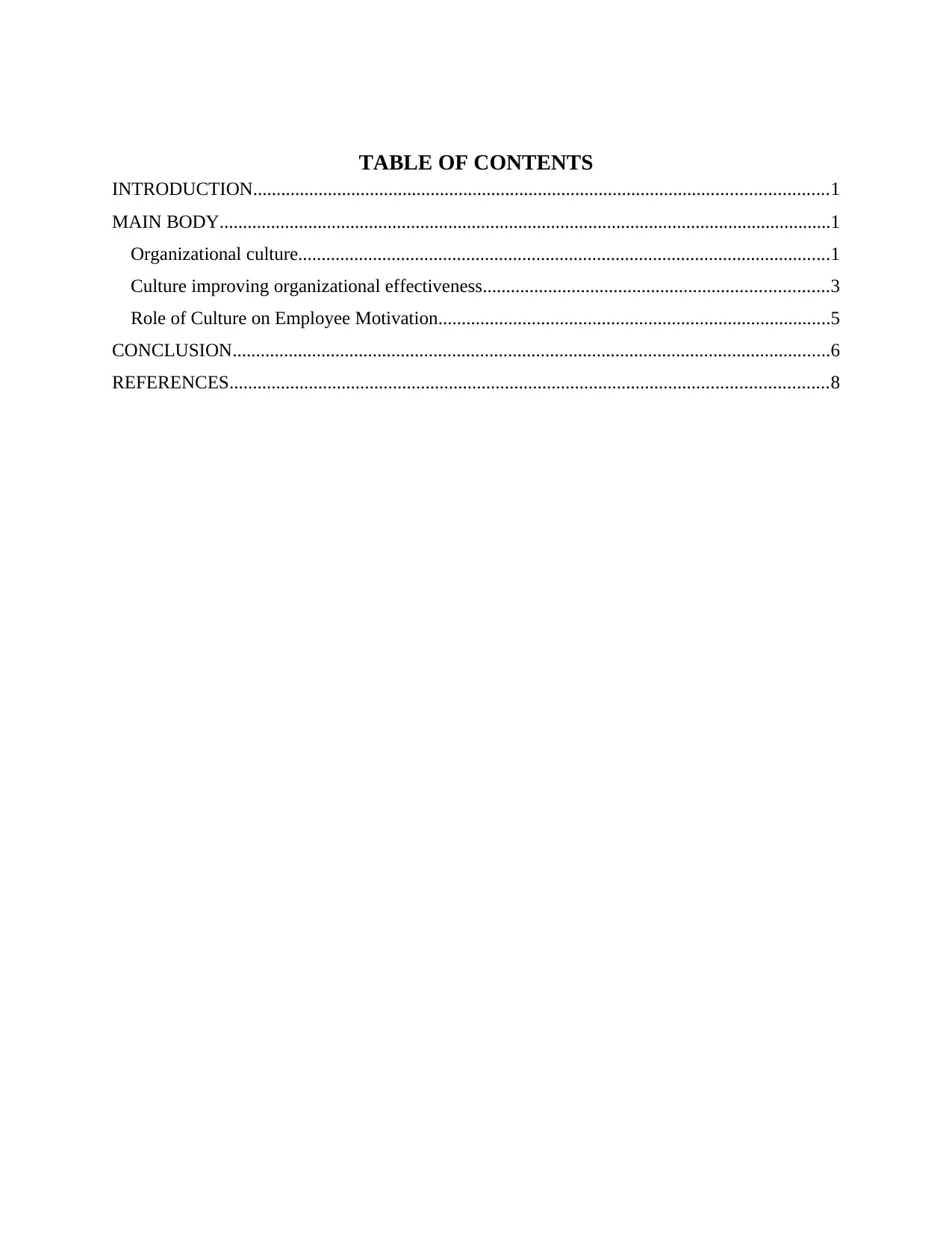
TABLE OF CONTENTS
INTRODUCTION...........................................................................................................................1
MAIN BODY...................................................................................................................................1
Organizational culture..................................................................................................................1
Culture improving organizational effectiveness..........................................................................3
Role of Culture on Employee Motivation....................................................................................5
CONCLUSION................................................................................................................................6
REFERENCES................................................................................................................................8
INTRODUCTION...........................................................................................................................1
MAIN BODY...................................................................................................................................1
Organizational culture..................................................................................................................1
Culture improving organizational effectiveness..........................................................................3
Role of Culture on Employee Motivation....................................................................................5
CONCLUSION................................................................................................................................6
REFERENCES................................................................................................................................8
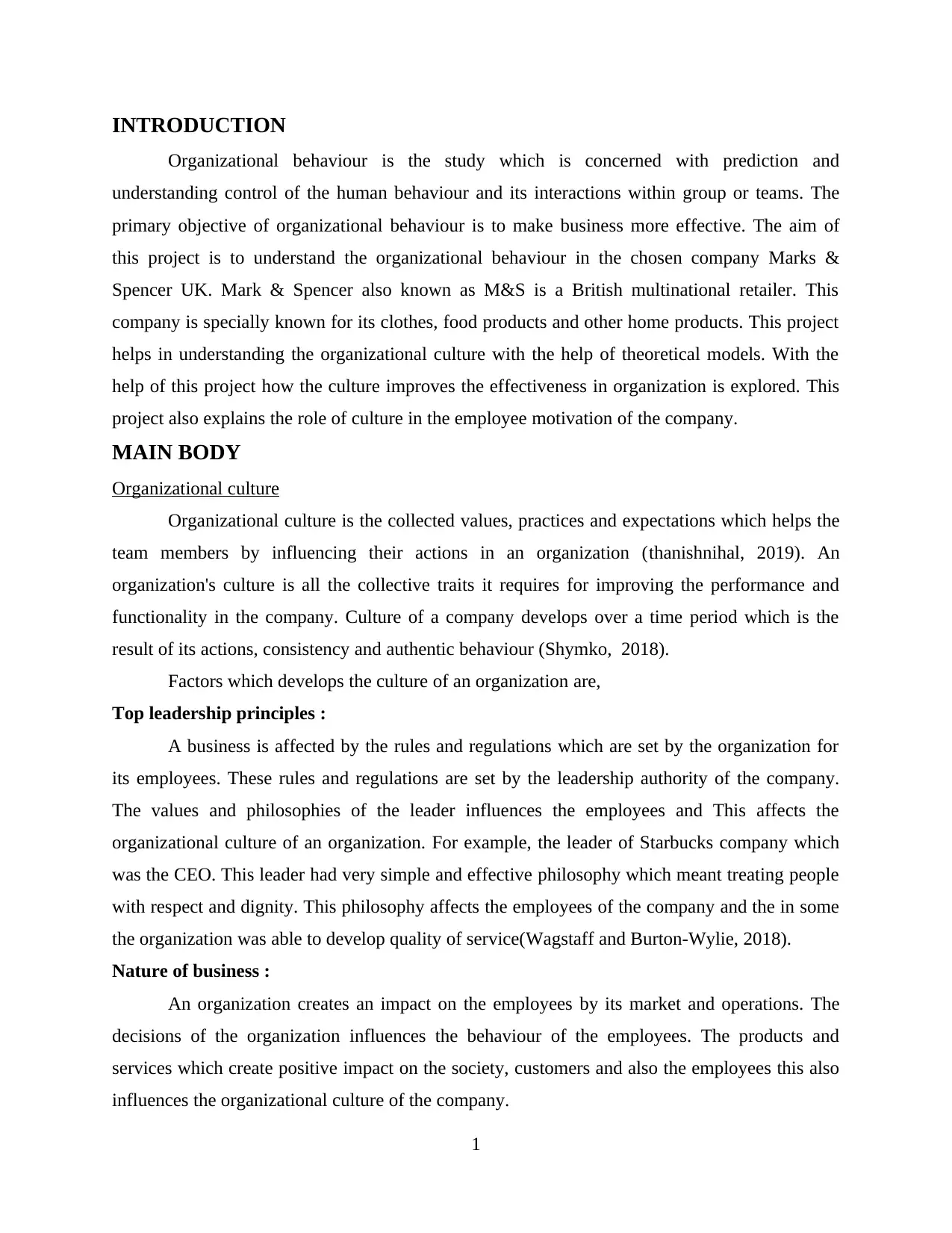
INTRODUCTION
Organizational behaviour is the study which is concerned with prediction and
understanding control of the human behaviour and its interactions within group or teams. The
primary objective of organizational behaviour is to make business more effective. The aim of
this project is to understand the organizational behaviour in the chosen company Marks &
Spencer UK. Mark & Spencer also known as M&S is a British multinational retailer. This
company is specially known for its clothes, food products and other home products. This project
helps in understanding the organizational culture with the help of theoretical models. With the
help of this project how the culture improves the effectiveness in organization is explored. This
project also explains the role of culture in the employee motivation of the company.
MAIN BODY
Organizational culture
Organizational culture is the collected values, practices and expectations which helps the
team members by influencing their actions in an organization (thanishnihal, 2019). An
organization's culture is all the collective traits it requires for improving the performance and
functionality in the company. Culture of a company develops over a time period which is the
result of its actions, consistency and authentic behaviour (Shymko, 2018).
Factors which develops the culture of an organization are,
Top leadership principles :
A business is affected by the rules and regulations which are set by the organization for
its employees. These rules and regulations are set by the leadership authority of the company.
The values and philosophies of the leader influences the employees and This affects the
organizational culture of an organization. For example, the leader of Starbucks company which
was the CEO. This leader had very simple and effective philosophy which meant treating people
with respect and dignity. This philosophy affects the employees of the company and the in some
the organization was able to develop quality of service(Wagstaff and Burton-Wylie, 2018).
Nature of business :
An organization creates an impact on the employees by its market and operations. The
decisions of the organization influences the behaviour of the employees. The products and
services which create positive impact on the society, customers and also the employees this also
influences the organizational culture of the company.
1
Organizational behaviour is the study which is concerned with prediction and
understanding control of the human behaviour and its interactions within group or teams. The
primary objective of organizational behaviour is to make business more effective. The aim of
this project is to understand the organizational behaviour in the chosen company Marks &
Spencer UK. Mark & Spencer also known as M&S is a British multinational retailer. This
company is specially known for its clothes, food products and other home products. This project
helps in understanding the organizational culture with the help of theoretical models. With the
help of this project how the culture improves the effectiveness in organization is explored. This
project also explains the role of culture in the employee motivation of the company.
MAIN BODY
Organizational culture
Organizational culture is the collected values, practices and expectations which helps the
team members by influencing their actions in an organization (thanishnihal, 2019). An
organization's culture is all the collective traits it requires for improving the performance and
functionality in the company. Culture of a company develops over a time period which is the
result of its actions, consistency and authentic behaviour (Shymko, 2018).
Factors which develops the culture of an organization are,
Top leadership principles :
A business is affected by the rules and regulations which are set by the organization for
its employees. These rules and regulations are set by the leadership authority of the company.
The values and philosophies of the leader influences the employees and This affects the
organizational culture of an organization. For example, the leader of Starbucks company which
was the CEO. This leader had very simple and effective philosophy which meant treating people
with respect and dignity. This philosophy affects the employees of the company and the in some
the organization was able to develop quality of service(Wagstaff and Burton-Wylie, 2018).
Nature of business :
An organization creates an impact on the employees by its market and operations. The
decisions of the organization influences the behaviour of the employees. The products and
services which create positive impact on the society, customers and also the employees this also
influences the organizational culture of the company.
1
⊘ This is a preview!⊘
Do you want full access?
Subscribe today to unlock all pages.

Trusted by 1+ million students worldwide
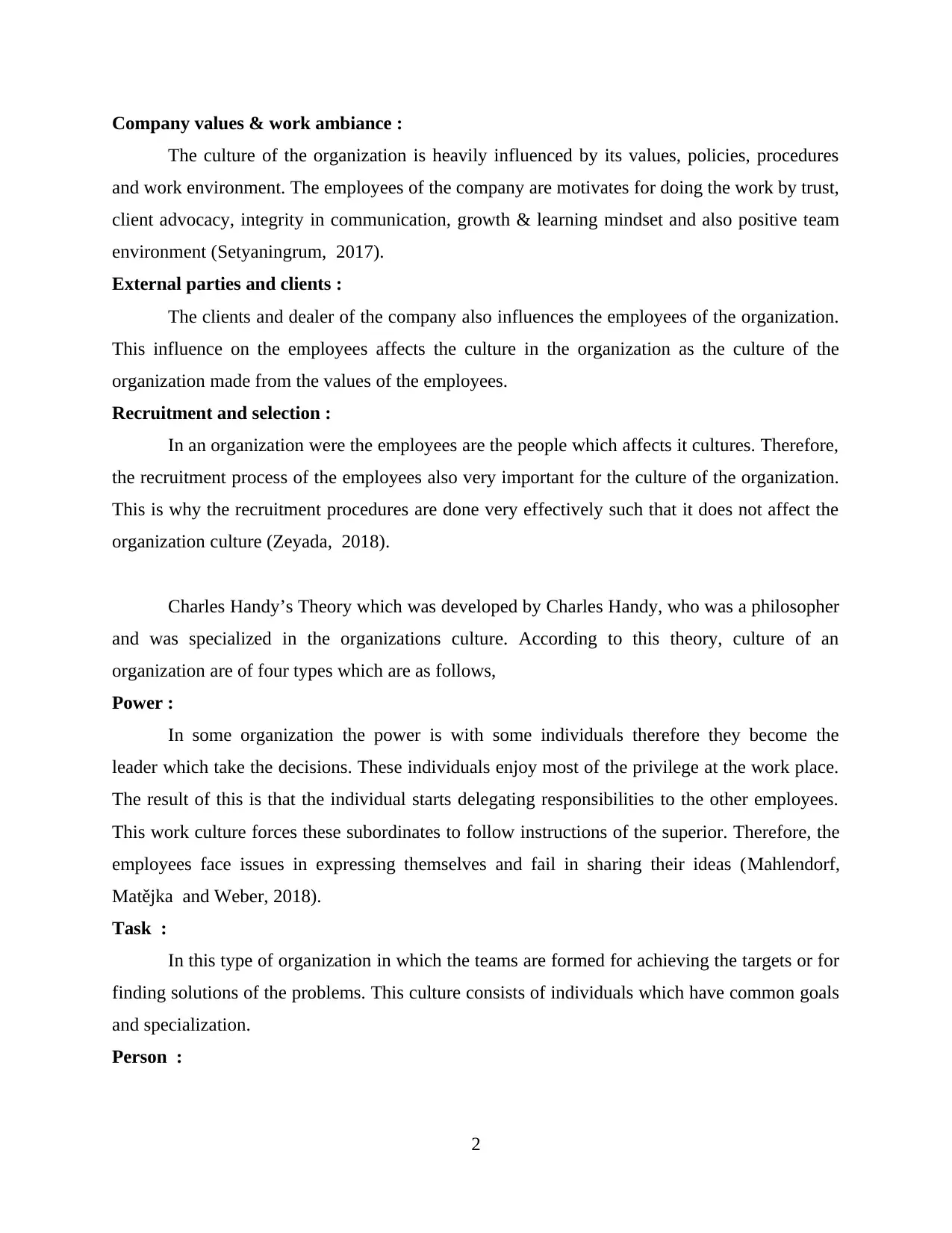
Company values & work ambiance :
The culture of the organization is heavily influenced by its values, policies, procedures
and work environment. The employees of the company are motivates for doing the work by trust,
client advocacy, integrity in communication, growth & learning mindset and also positive team
environment (Setyaningrum, 2017).
External parties and clients :
The clients and dealer of the company also influences the employees of the organization.
This influence on the employees affects the culture in the organization as the culture of the
organization made from the values of the employees.
Recruitment and selection :
In an organization were the employees are the people which affects it cultures. Therefore,
the recruitment process of the employees also very important for the culture of the organization.
This is why the recruitment procedures are done very effectively such that it does not affect the
organization culture (Zeyada, 2018).
Charles Handy’s Theory which was developed by Charles Handy, who was a philosopher
and was specialized in the organizations culture. According to this theory, culture of an
organization are of four types which are as follows,
Power :
In some organization the power is with some individuals therefore they become the
leader which take the decisions. These individuals enjoy most of the privilege at the work place.
The result of this is that the individual starts delegating responsibilities to the other employees.
This work culture forces these subordinates to follow instructions of the superior. Therefore, the
employees face issues in expressing themselves and fail in sharing their ideas (Mahlendorf,
Matějka and Weber, 2018).
Task :
In this type of organization in which the teams are formed for achieving the targets or for
finding solutions of the problems. This culture consists of individuals which have common goals
and specialization.
Person :
2
The culture of the organization is heavily influenced by its values, policies, procedures
and work environment. The employees of the company are motivates for doing the work by trust,
client advocacy, integrity in communication, growth & learning mindset and also positive team
environment (Setyaningrum, 2017).
External parties and clients :
The clients and dealer of the company also influences the employees of the organization.
This influence on the employees affects the culture in the organization as the culture of the
organization made from the values of the employees.
Recruitment and selection :
In an organization were the employees are the people which affects it cultures. Therefore,
the recruitment process of the employees also very important for the culture of the organization.
This is why the recruitment procedures are done very effectively such that it does not affect the
organization culture (Zeyada, 2018).
Charles Handy’s Theory which was developed by Charles Handy, who was a philosopher
and was specialized in the organizations culture. According to this theory, culture of an
organization are of four types which are as follows,
Power :
In some organization the power is with some individuals therefore they become the
leader which take the decisions. These individuals enjoy most of the privilege at the work place.
The result of this is that the individual starts delegating responsibilities to the other employees.
This work culture forces these subordinates to follow instructions of the superior. Therefore, the
employees face issues in expressing themselves and fail in sharing their ideas (Mahlendorf,
Matějka and Weber, 2018).
Task :
In this type of organization in which the teams are formed for achieving the targets or for
finding solutions of the problems. This culture consists of individuals which have common goals
and specialization.
Person :
2
Paraphrase This Document
Need a fresh take? Get an instant paraphrase of this document with our AI Paraphraser
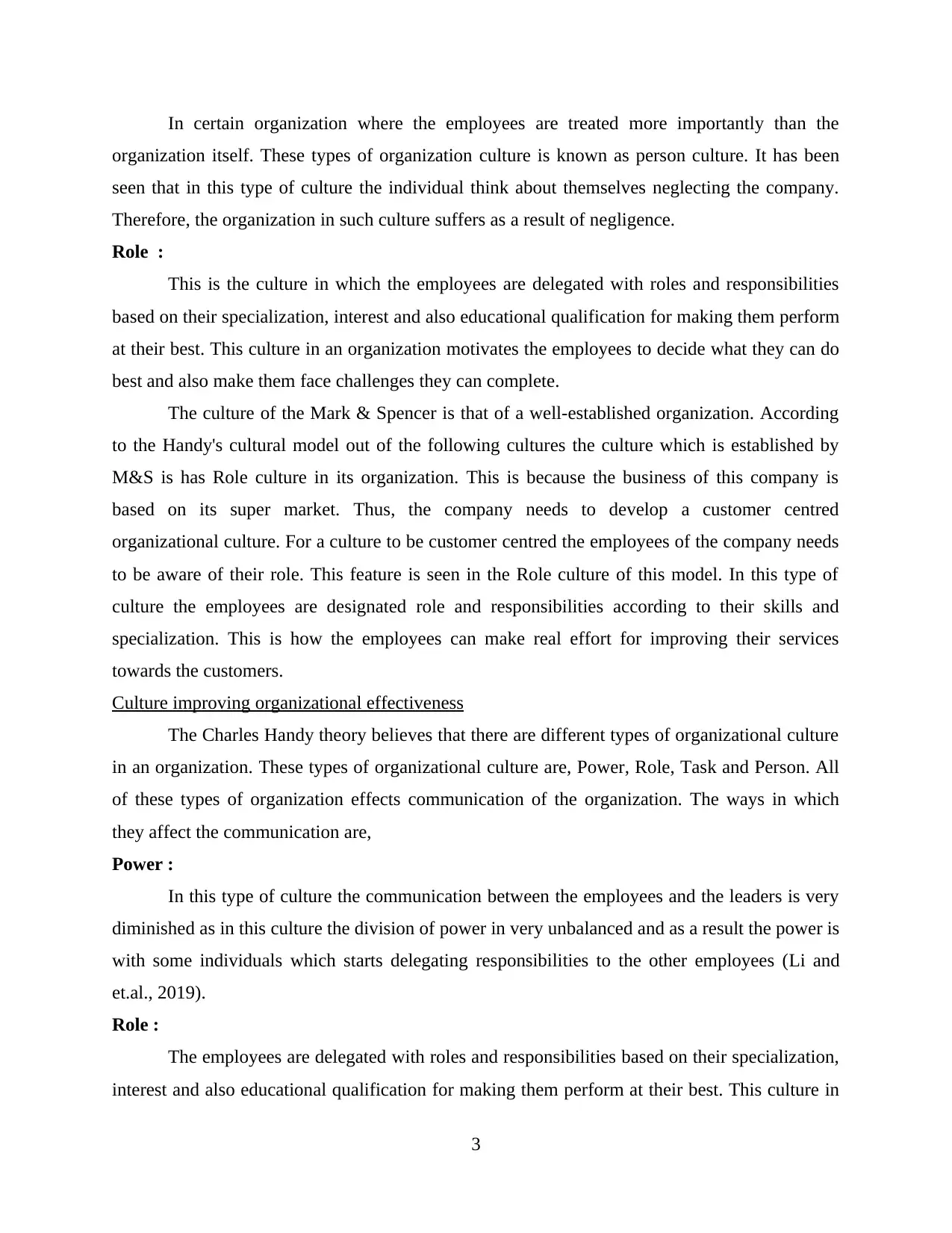
In certain organization where the employees are treated more importantly than the
organization itself. These types of organization culture is known as person culture. It has been
seen that in this type of culture the individual think about themselves neglecting the company.
Therefore, the organization in such culture suffers as a result of negligence.
Role :
This is the culture in which the employees are delegated with roles and responsibilities
based on their specialization, interest and also educational qualification for making them perform
at their best. This culture in an organization motivates the employees to decide what they can do
best and also make them face challenges they can complete.
The culture of the Mark & Spencer is that of a well-established organization. According
to the Handy's cultural model out of the following cultures the culture which is established by
M&S is has Role culture in its organization. This is because the business of this company is
based on its super market. Thus, the company needs to develop a customer centred
organizational culture. For a culture to be customer centred the employees of the company needs
to be aware of their role. This feature is seen in the Role culture of this model. In this type of
culture the employees are designated role and responsibilities according to their skills and
specialization. This is how the employees can make real effort for improving their services
towards the customers.
Culture improving organizational effectiveness
The Charles Handy theory believes that there are different types of organizational culture
in an organization. These types of organizational culture are, Power, Role, Task and Person. All
of these types of organization effects communication of the organization. The ways in which
they affect the communication are,
Power :
In this type of culture the communication between the employees and the leaders is very
diminished as in this culture the division of power in very unbalanced and as a result the power is
with some individuals which starts delegating responsibilities to the other employees (Li and
et.al., 2019).
Role :
The employees are delegated with roles and responsibilities based on their specialization,
interest and also educational qualification for making them perform at their best. This culture in
3
organization itself. These types of organization culture is known as person culture. It has been
seen that in this type of culture the individual think about themselves neglecting the company.
Therefore, the organization in such culture suffers as a result of negligence.
Role :
This is the culture in which the employees are delegated with roles and responsibilities
based on their specialization, interest and also educational qualification for making them perform
at their best. This culture in an organization motivates the employees to decide what they can do
best and also make them face challenges they can complete.
The culture of the Mark & Spencer is that of a well-established organization. According
to the Handy's cultural model out of the following cultures the culture which is established by
M&S is has Role culture in its organization. This is because the business of this company is
based on its super market. Thus, the company needs to develop a customer centred
organizational culture. For a culture to be customer centred the employees of the company needs
to be aware of their role. This feature is seen in the Role culture of this model. In this type of
culture the employees are designated role and responsibilities according to their skills and
specialization. This is how the employees can make real effort for improving their services
towards the customers.
Culture improving organizational effectiveness
The Charles Handy theory believes that there are different types of organizational culture
in an organization. These types of organizational culture are, Power, Role, Task and Person. All
of these types of organization effects communication of the organization. The ways in which
they affect the communication are,
Power :
In this type of culture the communication between the employees and the leaders is very
diminished as in this culture the division of power in very unbalanced and as a result the power is
with some individuals which starts delegating responsibilities to the other employees (Li and
et.al., 2019).
Role :
The employees are delegated with roles and responsibilities based on their specialization,
interest and also educational qualification for making them perform at their best. This culture in
3
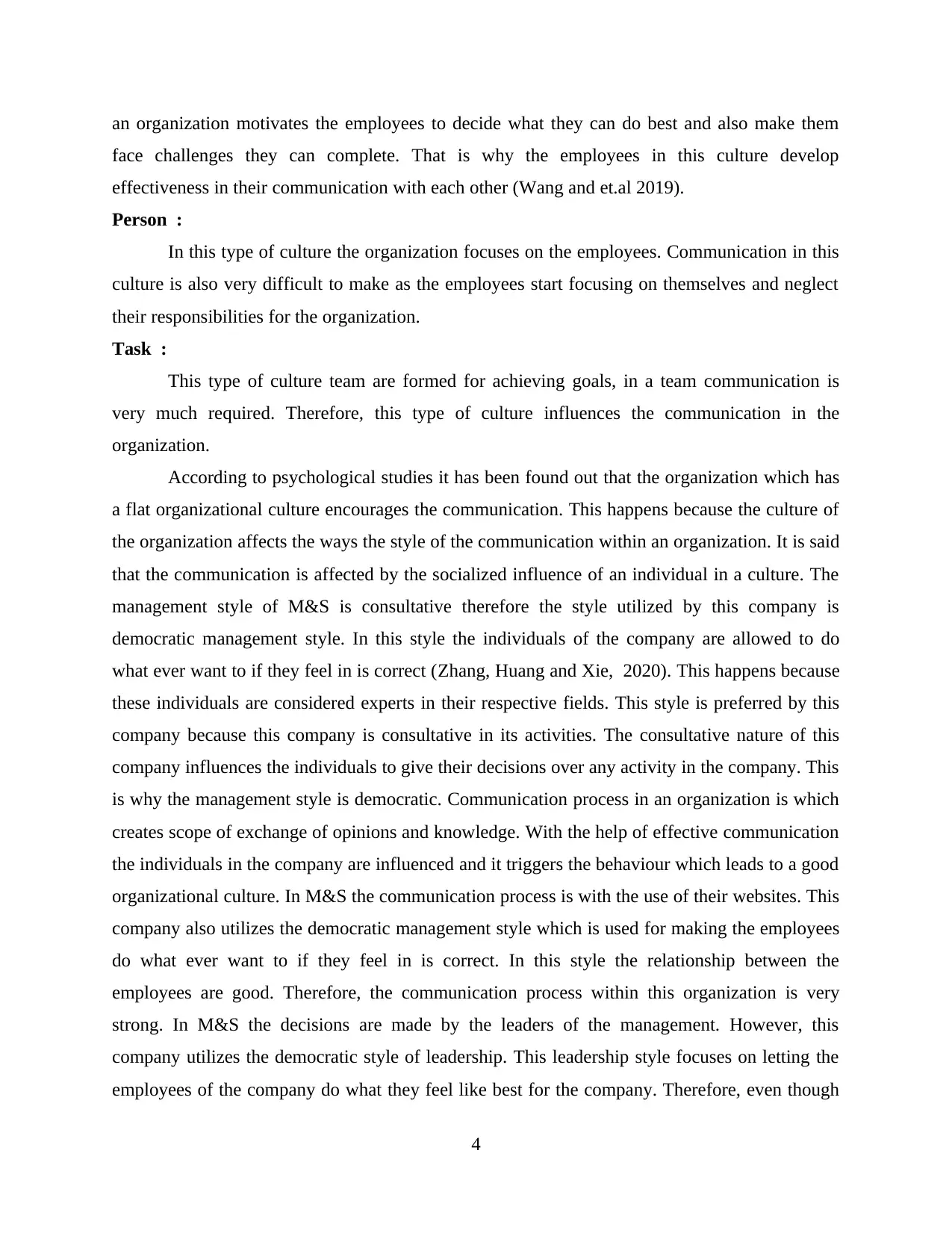
an organization motivates the employees to decide what they can do best and also make them
face challenges they can complete. That is why the employees in this culture develop
effectiveness in their communication with each other (Wang and et.al 2019).
Person :
In this type of culture the organization focuses on the employees. Communication in this
culture is also very difficult to make as the employees start focusing on themselves and neglect
their responsibilities for the organization.
Task :
This type of culture team are formed for achieving goals, in a team communication is
very much required. Therefore, this type of culture influences the communication in the
organization.
According to psychological studies it has been found out that the organization which has
a flat organizational culture encourages the communication. This happens because the culture of
the organization affects the ways the style of the communication within an organization. It is said
that the communication is affected by the socialized influence of an individual in a culture. The
management style of M&S is consultative therefore the style utilized by this company is
democratic management style. In this style the individuals of the company are allowed to do
what ever want to if they feel in is correct (Zhang, Huang and Xie, 2020). This happens because
these individuals are considered experts in their respective fields. This style is preferred by this
company because this company is consultative in its activities. The consultative nature of this
company influences the individuals to give their decisions over any activity in the company. This
is why the management style is democratic. Communication process in an organization is which
creates scope of exchange of opinions and knowledge. With the help of effective communication
the individuals in the company are influenced and it triggers the behaviour which leads to a good
organizational culture. In M&S the communication process is with the use of their websites. This
company also utilizes the democratic management style which is used for making the employees
do what ever want to if they feel in is correct. In this style the relationship between the
employees are good. Therefore, the communication process within this organization is very
strong. In M&S the decisions are made by the leaders of the management. However, this
company utilizes the democratic style of leadership. This leadership style focuses on letting the
employees of the company do what they feel like best for the company. Therefore, even though
4
face challenges they can complete. That is why the employees in this culture develop
effectiveness in their communication with each other (Wang and et.al 2019).
Person :
In this type of culture the organization focuses on the employees. Communication in this
culture is also very difficult to make as the employees start focusing on themselves and neglect
their responsibilities for the organization.
Task :
This type of culture team are formed for achieving goals, in a team communication is
very much required. Therefore, this type of culture influences the communication in the
organization.
According to psychological studies it has been found out that the organization which has
a flat organizational culture encourages the communication. This happens because the culture of
the organization affects the ways the style of the communication within an organization. It is said
that the communication is affected by the socialized influence of an individual in a culture. The
management style of M&S is consultative therefore the style utilized by this company is
democratic management style. In this style the individuals of the company are allowed to do
what ever want to if they feel in is correct (Zhang, Huang and Xie, 2020). This happens because
these individuals are considered experts in their respective fields. This style is preferred by this
company because this company is consultative in its activities. The consultative nature of this
company influences the individuals to give their decisions over any activity in the company. This
is why the management style is democratic. Communication process in an organization is which
creates scope of exchange of opinions and knowledge. With the help of effective communication
the individuals in the company are influenced and it triggers the behaviour which leads to a good
organizational culture. In M&S the communication process is with the use of their websites. This
company also utilizes the democratic management style which is used for making the employees
do what ever want to if they feel in is correct. In this style the relationship between the
employees are good. Therefore, the communication process within this organization is very
strong. In M&S the decisions are made by the leaders of the management. However, this
company utilizes the democratic style of leadership. This leadership style focuses on letting the
employees of the company do what they feel like best for the company. Therefore, even though
4
⊘ This is a preview!⊘
Do you want full access?
Subscribe today to unlock all pages.

Trusted by 1+ million students worldwide
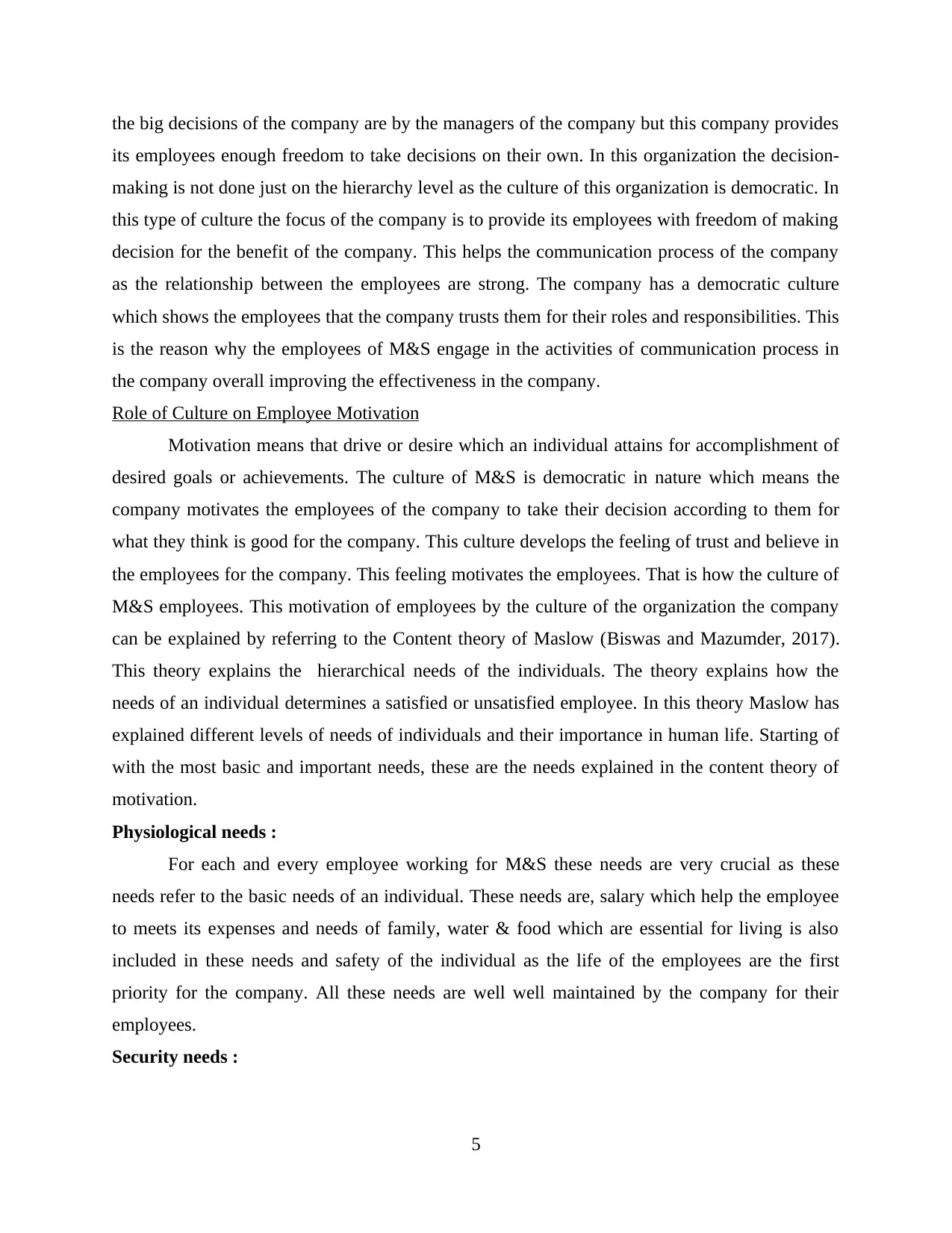
the big decisions of the company are by the managers of the company but this company provides
its employees enough freedom to take decisions on their own. In this organization the decision-
making is not done just on the hierarchy level as the culture of this organization is democratic. In
this type of culture the focus of the company is to provide its employees with freedom of making
decision for the benefit of the company. This helps the communication process of the company
as the relationship between the employees are strong. The company has a democratic culture
which shows the employees that the company trusts them for their roles and responsibilities. This
is the reason why the employees of M&S engage in the activities of communication process in
the company overall improving the effectiveness in the company.
Role of Culture on Employee Motivation
Motivation means that drive or desire which an individual attains for accomplishment of
desired goals or achievements. The culture of M&S is democratic in nature which means the
company motivates the employees of the company to take their decision according to them for
what they think is good for the company. This culture develops the feeling of trust and believe in
the employees for the company. This feeling motivates the employees. That is how the culture of
M&S employees. This motivation of employees by the culture of the organization the company
can be explained by referring to the Content theory of Maslow (Biswas and Mazumder, 2017).
This theory explains the hierarchical needs of the individuals. The theory explains how the
needs of an individual determines a satisfied or unsatisfied employee. In this theory Maslow has
explained different levels of needs of individuals and their importance in human life. Starting of
with the most basic and important needs, these are the needs explained in the content theory of
motivation.
Physiological needs :
For each and every employee working for M&S these needs are very crucial as these
needs refer to the basic needs of an individual. These needs are, salary which help the employee
to meets its expenses and needs of family, water & food which are essential for living is also
included in these needs and safety of the individual as the life of the employees are the first
priority for the company. All these needs are well well maintained by the company for their
employees.
Security needs :
5
its employees enough freedom to take decisions on their own. In this organization the decision-
making is not done just on the hierarchy level as the culture of this organization is democratic. In
this type of culture the focus of the company is to provide its employees with freedom of making
decision for the benefit of the company. This helps the communication process of the company
as the relationship between the employees are strong. The company has a democratic culture
which shows the employees that the company trusts them for their roles and responsibilities. This
is the reason why the employees of M&S engage in the activities of communication process in
the company overall improving the effectiveness in the company.
Role of Culture on Employee Motivation
Motivation means that drive or desire which an individual attains for accomplishment of
desired goals or achievements. The culture of M&S is democratic in nature which means the
company motivates the employees of the company to take their decision according to them for
what they think is good for the company. This culture develops the feeling of trust and believe in
the employees for the company. This feeling motivates the employees. That is how the culture of
M&S employees. This motivation of employees by the culture of the organization the company
can be explained by referring to the Content theory of Maslow (Biswas and Mazumder, 2017).
This theory explains the hierarchical needs of the individuals. The theory explains how the
needs of an individual determines a satisfied or unsatisfied employee. In this theory Maslow has
explained different levels of needs of individuals and their importance in human life. Starting of
with the most basic and important needs, these are the needs explained in the content theory of
motivation.
Physiological needs :
For each and every employee working for M&S these needs are very crucial as these
needs refer to the basic needs of an individual. These needs are, salary which help the employee
to meets its expenses and needs of family, water & food which are essential for living is also
included in these needs and safety of the individual as the life of the employees are the first
priority for the company. All these needs are well well maintained by the company for their
employees.
Security needs :
5
Paraphrase This Document
Need a fresh take? Get an instant paraphrase of this document with our AI Paraphraser
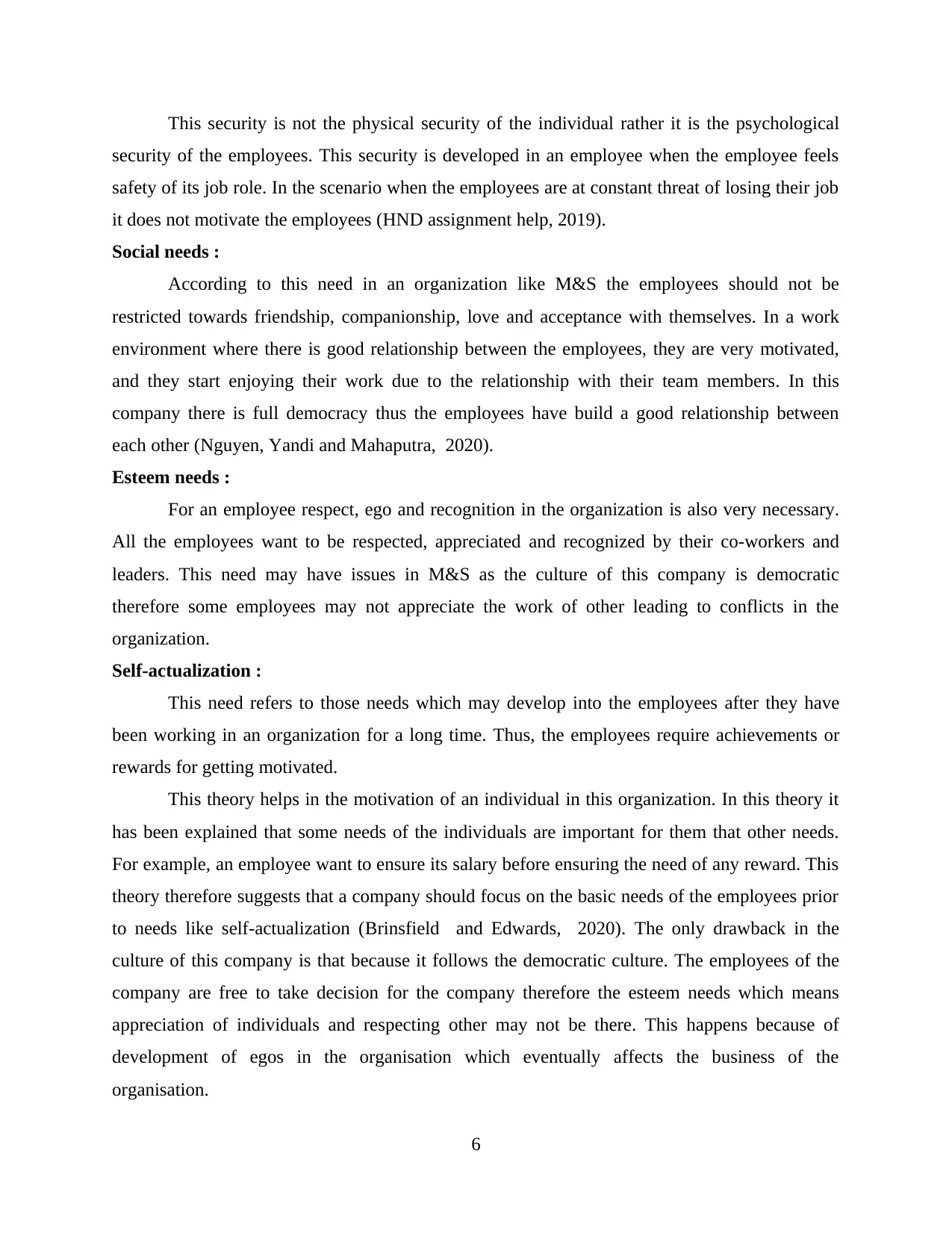
This security is not the physical security of the individual rather it is the psychological
security of the employees. This security is developed in an employee when the employee feels
safety of its job role. In the scenario when the employees are at constant threat of losing their job
it does not motivate the employees (HND assignment help, 2019).
Social needs :
According to this need in an organization like M&S the employees should not be
restricted towards friendship, companionship, love and acceptance with themselves. In a work
environment where there is good relationship between the employees, they are very motivated,
and they start enjoying their work due to the relationship with their team members. In this
company there is full democracy thus the employees have build a good relationship between
each other (Nguyen, Yandi and Mahaputra, 2020).
Esteem needs :
For an employee respect, ego and recognition in the organization is also very necessary.
All the employees want to be respected, appreciated and recognized by their co-workers and
leaders. This need may have issues in M&S as the culture of this company is democratic
therefore some employees may not appreciate the work of other leading to conflicts in the
organization.
Self-actualization :
This need refers to those needs which may develop into the employees after they have
been working in an organization for a long time. Thus, the employees require achievements or
rewards for getting motivated.
This theory helps in the motivation of an individual in this organization. In this theory it
has been explained that some needs of the individuals are important for them that other needs.
For example, an employee want to ensure its salary before ensuring the need of any reward. This
theory therefore suggests that a company should focus on the basic needs of the employees prior
to needs like self-actualization (Brinsfield and Edwards, 2020). The only drawback in the
culture of this company is that because it follows the democratic culture. The employees of the
company are free to take decision for the company therefore the esteem needs which means
appreciation of individuals and respecting other may not be there. This happens because of
development of egos in the organisation which eventually affects the business of the
organisation.
6
security of the employees. This security is developed in an employee when the employee feels
safety of its job role. In the scenario when the employees are at constant threat of losing their job
it does not motivate the employees (HND assignment help, 2019).
Social needs :
According to this need in an organization like M&S the employees should not be
restricted towards friendship, companionship, love and acceptance with themselves. In a work
environment where there is good relationship between the employees, they are very motivated,
and they start enjoying their work due to the relationship with their team members. In this
company there is full democracy thus the employees have build a good relationship between
each other (Nguyen, Yandi and Mahaputra, 2020).
Esteem needs :
For an employee respect, ego and recognition in the organization is also very necessary.
All the employees want to be respected, appreciated and recognized by their co-workers and
leaders. This need may have issues in M&S as the culture of this company is democratic
therefore some employees may not appreciate the work of other leading to conflicts in the
organization.
Self-actualization :
This need refers to those needs which may develop into the employees after they have
been working in an organization for a long time. Thus, the employees require achievements or
rewards for getting motivated.
This theory helps in the motivation of an individual in this organization. In this theory it
has been explained that some needs of the individuals are important for them that other needs.
For example, an employee want to ensure its salary before ensuring the need of any reward. This
theory therefore suggests that a company should focus on the basic needs of the employees prior
to needs like self-actualization (Brinsfield and Edwards, 2020). The only drawback in the
culture of this company is that because it follows the democratic culture. The employees of the
company are free to take decision for the company therefore the esteem needs which means
appreciation of individuals and respecting other may not be there. This happens because of
development of egos in the organisation which eventually affects the business of the
organisation.
6
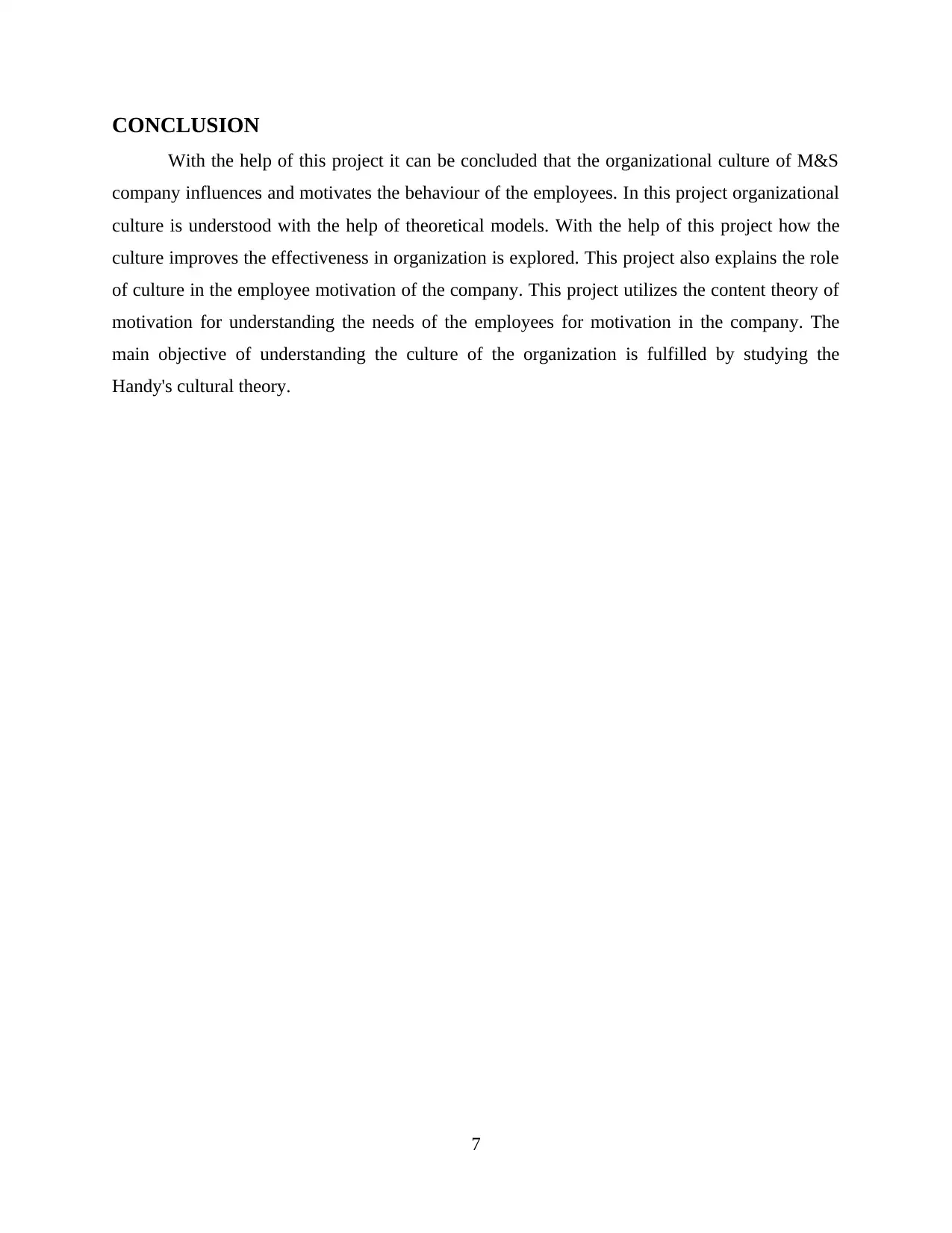
CONCLUSION
With the help of this project it can be concluded that the organizational culture of M&S
company influences and motivates the behaviour of the employees. In this project organizational
culture is understood with the help of theoretical models. With the help of this project how the
culture improves the effectiveness in organization is explored. This project also explains the role
of culture in the employee motivation of the company. This project utilizes the content theory of
motivation for understanding the needs of the employees for motivation in the company. The
main objective of understanding the culture of the organization is fulfilled by studying the
Handy's cultural theory.
7
With the help of this project it can be concluded that the organizational culture of M&S
company influences and motivates the behaviour of the employees. In this project organizational
culture is understood with the help of theoretical models. With the help of this project how the
culture improves the effectiveness in organization is explored. This project also explains the role
of culture in the employee motivation of the company. This project utilizes the content theory of
motivation for understanding the needs of the employees for motivation in the company. The
main objective of understanding the culture of the organization is fulfilled by studying the
Handy's cultural theory.
7
⊘ This is a preview!⊘
Do you want full access?
Subscribe today to unlock all pages.

Trusted by 1+ million students worldwide
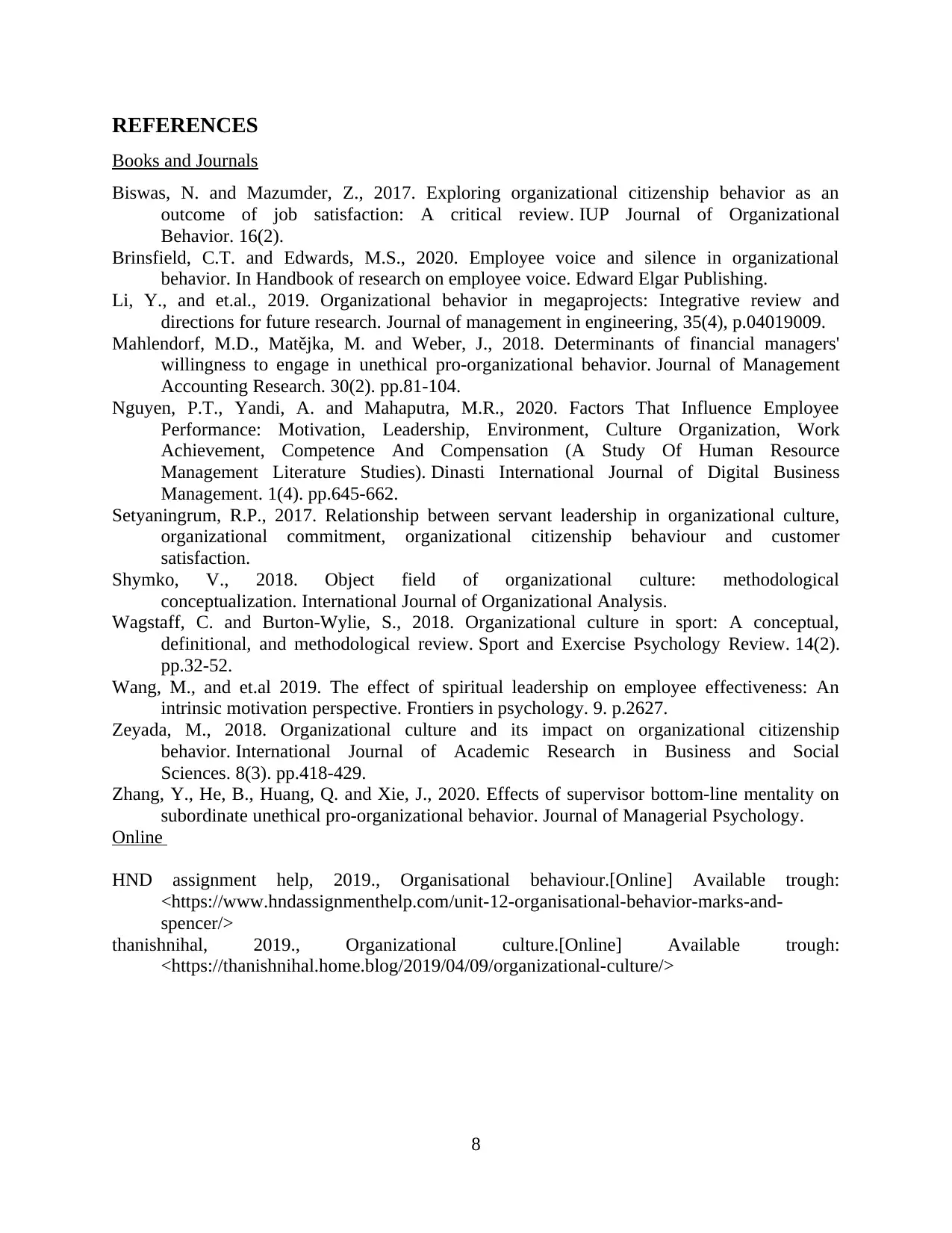
REFERENCES
Books and Journals
Biswas, N. and Mazumder, Z., 2017. Exploring organizational citizenship behavior as an
outcome of job satisfaction: A critical review. IUP Journal of Organizational
Behavior. 16(2).
Brinsfield, C.T. and Edwards, M.S., 2020. Employee voice and silence in organizational
behavior. In Handbook of research on employee voice. Edward Elgar Publishing.
Li, Y., and et.al., 2019. Organizational behavior in megaprojects: Integrative review and
directions for future research. Journal of management in engineering, 35(4), p.04019009.
Mahlendorf, M.D., Matějka, M. and Weber, J., 2018. Determinants of financial managers'
willingness to engage in unethical pro-organizational behavior. Journal of Management
Accounting Research. 30(2). pp.81-104.
Nguyen, P.T., Yandi, A. and Mahaputra, M.R., 2020. Factors That Influence Employee
Performance: Motivation, Leadership, Environment, Culture Organization, Work
Achievement, Competence And Compensation (A Study Of Human Resource
Management Literature Studies). Dinasti International Journal of Digital Business
Management. 1(4). pp.645-662.
Setyaningrum, R.P., 2017. Relationship between servant leadership in organizational culture,
organizational commitment, organizational citizenship behaviour and customer
satisfaction.
Shymko, V., 2018. Object field of organizational culture: methodological
conceptualization. International Journal of Organizational Analysis.
Wagstaff, C. and Burton-Wylie, S., 2018. Organizational culture in sport: A conceptual,
definitional, and methodological review. Sport and Exercise Psychology Review. 14(2).
pp.32-52.
Wang, M., and et.al 2019. The effect of spiritual leadership on employee effectiveness: An
intrinsic motivation perspective. Frontiers in psychology. 9. p.2627.
Zeyada, M., 2018. Organizational culture and its impact on organizational citizenship
behavior. International Journal of Academic Research in Business and Social
Sciences. 8(3). pp.418-429.
Zhang, Y., He, B., Huang, Q. and Xie, J., 2020. Effects of supervisor bottom-line mentality on
subordinate unethical pro-organizational behavior. Journal of Managerial Psychology.
Online
HND assignment help, 2019., Organisational behaviour.[Online] Available trough:
<https://www.hndassignmenthelp.com/unit-12-organisational-behavior-marks-and-
spencer/>
thanishnihal, 2019., Organizational culture.[Online] Available trough:
<https://thanishnihal.home.blog/2019/04/09/organizational-culture/>
8
Books and Journals
Biswas, N. and Mazumder, Z., 2017. Exploring organizational citizenship behavior as an
outcome of job satisfaction: A critical review. IUP Journal of Organizational
Behavior. 16(2).
Brinsfield, C.T. and Edwards, M.S., 2020. Employee voice and silence in organizational
behavior. In Handbook of research on employee voice. Edward Elgar Publishing.
Li, Y., and et.al., 2019. Organizational behavior in megaprojects: Integrative review and
directions for future research. Journal of management in engineering, 35(4), p.04019009.
Mahlendorf, M.D., Matějka, M. and Weber, J., 2018. Determinants of financial managers'
willingness to engage in unethical pro-organizational behavior. Journal of Management
Accounting Research. 30(2). pp.81-104.
Nguyen, P.T., Yandi, A. and Mahaputra, M.R., 2020. Factors That Influence Employee
Performance: Motivation, Leadership, Environment, Culture Organization, Work
Achievement, Competence And Compensation (A Study Of Human Resource
Management Literature Studies). Dinasti International Journal of Digital Business
Management. 1(4). pp.645-662.
Setyaningrum, R.P., 2017. Relationship between servant leadership in organizational culture,
organizational commitment, organizational citizenship behaviour and customer
satisfaction.
Shymko, V., 2018. Object field of organizational culture: methodological
conceptualization. International Journal of Organizational Analysis.
Wagstaff, C. and Burton-Wylie, S., 2018. Organizational culture in sport: A conceptual,
definitional, and methodological review. Sport and Exercise Psychology Review. 14(2).
pp.32-52.
Wang, M., and et.al 2019. The effect of spiritual leadership on employee effectiveness: An
intrinsic motivation perspective. Frontiers in psychology. 9. p.2627.
Zeyada, M., 2018. Organizational culture and its impact on organizational citizenship
behavior. International Journal of Academic Research in Business and Social
Sciences. 8(3). pp.418-429.
Zhang, Y., He, B., Huang, Q. and Xie, J., 2020. Effects of supervisor bottom-line mentality on
subordinate unethical pro-organizational behavior. Journal of Managerial Psychology.
Online
HND assignment help, 2019., Organisational behaviour.[Online] Available trough:
<https://www.hndassignmenthelp.com/unit-12-organisational-behavior-marks-and-
spencer/>
thanishnihal, 2019., Organizational culture.[Online] Available trough:
<https://thanishnihal.home.blog/2019/04/09/organizational-culture/>
8
1 out of 10
Related Documents
Your All-in-One AI-Powered Toolkit for Academic Success.
+13062052269
info@desklib.com
Available 24*7 on WhatsApp / Email
![[object Object]](/_next/static/media/star-bottom.7253800d.svg)
Unlock your academic potential
Copyright © 2020–2025 A2Z Services. All Rights Reserved. Developed and managed by ZUCOL.




